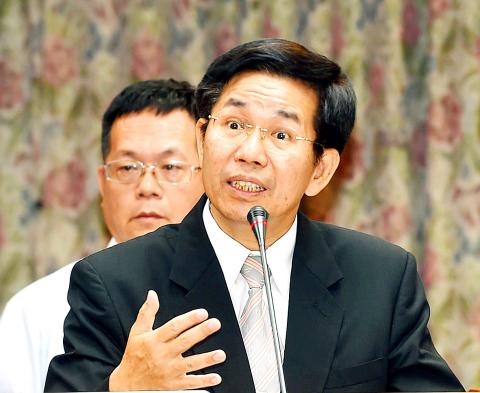Universities should move toward abolishing dormitory curfews by implementing diversified management rules, Minister of Education Pan Wen-chung (潘文忠) said yesterday.
Pan made the remarks during a question-and-answer session at a meeting of the legislature’s Culture and Education Committee, where several lawmakers asked questions about the controversy surrounding a student-led protest against a curfew that Fu Jen Catholic University imposed on female students living in dormitories.
The education minister initially refrained from giving a direct response when Democratic Progressive Party (DPP) Legislator Su Chiao-hui (蘇巧慧) asked his opinion on imposing curfews on female students, saying that universities have jurisdiction over the issue.

Photo: Fang Pin-chao, Taipei Times
DPP Legislator Rosalia Wu (吳思瑤) asked Pan to clarify his stance on the issue.
“Are such unreasonable access controls protecting female students, or are they putting them in greater danger?” Wu asked.
Pan said that the students are advocating total abolition of dormitory curfews, but that he thinks alternative management rules should be put in place before curfews are lifted.
When asked by DPP Legislator Hsu Chih-chieh (許智傑) how he would respond to students if he were the dean of Fu Jen, Pan said that he would probably issue identification cards to female students, granting them unlimited access to their dormitories via a card reader, provided that the time at which the students leave and return to their dormitories is recorded and forwarded to their parents.
Hsu showed a petition calling for the abolition of dormitory curfews at universities handed out by FJU Cinderella, a group formed by students opposed to the curfew, and asked Pan if he would sign it.
Pan said that he would if the language used in the petition were changed to: “I support abolishing dormitory curfews if accompanying measures are in place.”
In related news, Pan said that the ministry would form a new curriculum review committee comprising students, officials and experts within two months in accordance with a recently passed amendment to the Senior High School Education Act (高級中等教育法).
The new committee would be in charge of reviewing curriculum guidelines being drafted for a 12-year national education system, which are set to take effect in 2018.
Pan said that six draft proposals for the so-called “examination-enrollment corelative system” to be used in the 12-year national education system were discussed yesterday at a meeting of the Board of College Recruitment Commission, but that no conclusions had been reached.
The new testing system would come into effect in 2021, he said.

ANOTHER EMERGES: The CWA yesterday said this year’s fourth storm of the typhoon season had formed in the South China Sea, but was not expected to affect Taiwan Tropical Storm Gaemi has intensified slightly as it heads toward Taiwan, where it is expected to affect the country in the coming days, the Central Weather Administration (CWA) said yesterday. As of 8am yesterday, the 120km-radius storm was 800km southeast of Oluanpi (鵝鑾鼻), Taiwan’s southernmost tip, moving at 9kph northwest, the agency said. A sea warning for Gaemi could be issued tonight at the earliest, it said, adding that the storm is projected to be closest to Taiwan on Wednesday or Thursday. Gaemi’s potential effect on Taiwan remains unclear, as that would depend on its direction, radius and intensity, forecasters said. Former Weather Forecast

As COVID-19 cases in Japan have been increasing for 10 consecutive weeks, people should get vaccinated before visiting the nation, the Centers for Disease Control (CDC) said. The centers reported 773 hospitalizations and 124 deaths related to COVID-19 in Taiwan last week. CDC Epidemic Intelligence Center Director Guo Hung-wei (郭宏偉) on Tuesday said the number of weekly COVID-19 cases reported in Japan has been increasing since mid-May and surpassed 55,000 cases from July 8 to July 14. The average number of COVID-19 patients at Japan’s healthcare facilities that week was also 1.39 times that of the week before and KP.3 is the dominant

The Chinese Communist Party’s (CCP) working group for Taiwan-related policies is likely to be upgraded to a committee-level body, a report commissioned by the Mainland Affairs Council (MAC) said. As Chinese President Xi Jinping (習近平) is increasingly likely to upgrade the CCP’s Central Leading Group for Taiwan Affairs, Taiwanese authorities should prepare by researching Xi and the CCP, the report said. At the third plenary session of the 20th Central Committee of the CCP, which ended on Thursday last week, the party set a target of 2029 for the completion of some tasks, meaning that Xi is likely preparing to

US-CHINA TRADE DISPUTE: Despite Beijing’s offer of preferential treatment, the lure of China has dimmed as Taiwanese and international investors move out Japan and the US have become the favored destinations for Taiwanese graduates as China’s attraction has waned over the years, the Ministry of Labor said. According to the ministry’s latest income and employment advisory published this month, 3,215 Taiwanese university graduates from the class of 2020 went to Japan, surpassing for the first time the 2,881 graduates who went to China. A total of 2,300 graduates from the class of 2021 went to the US, compared with the 2,262 who went to China, the document showed. The trend continued for the class of 2023, of whom 1,460 went to Japan, 1,334 went to